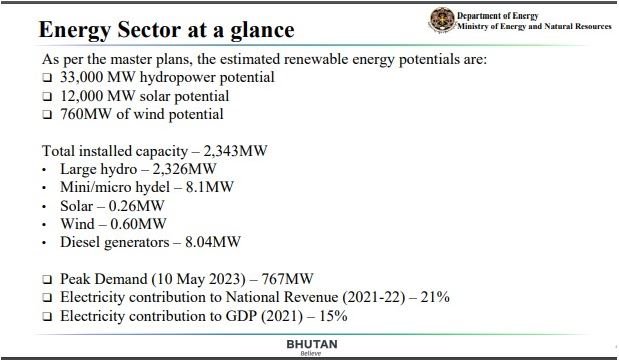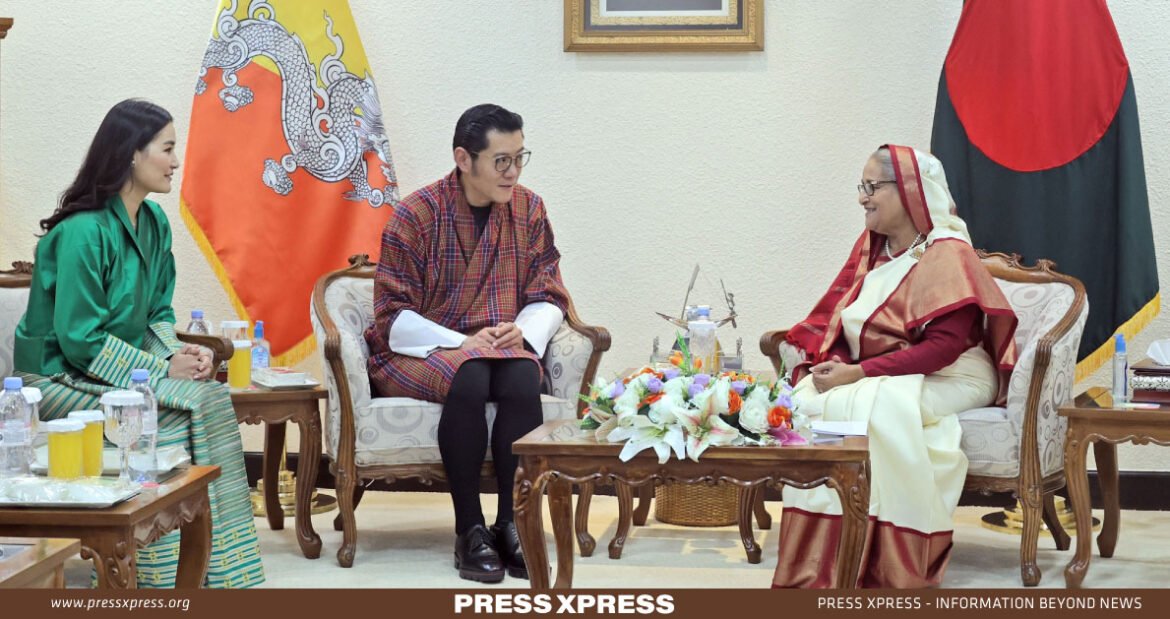- Both sides issue a joint statement acknowledging the progress
- The King will attend the National Day celebrations
- Agreement between Bangladesh and Bhutan on Cultural cooperation renewed
Bhutanese King Jigme Khesar Namgyel Wangchuck’s recent state visit to Bangladesh has marked a significant milestone in strengthening the enduring bonds of friendship, cooperation, and goodwill between the two nations. This four-day visit of the King to Bangladesh is a witness of the close ties of friendship and goodwill that so happily exist between the two countries.
The bilateral visit between Bangladesh and Bhutan is poised to catalyze improvements across various sectors for Bangladesh. This diplomatic engagement has resulted in the signing of three new Memorandums of Understanding (MoUs), aiming to bolster cooperation between the two neighboring nations.Regional connectivity also will be enhanced through this initiative.
The visit commenced with a warm reception at Hazrat Shahjalal International Airport by President Mohammed Shahabuddin. Upon his arrival, King Jigme, accompanied by a delegation, embarked on a journey of mutual goodwill and understanding.
A pivotal moment of the visit was the meeting between King Jigme and Prime Minister Sheikh Hasina, resulting in a joint statement that reflected on the progress made in bilateral relations. Both leaders stressed the importance of enhancing cooperation in sectors such as trade, connectivity, cultural exchange, and education.
Bangladesh, Bhutan sign 3 new MoUs, renew 1
On Monday, Bangladesh and Bhutan inked three fresh memorandums of understanding (MoUs) and extended one existing agreement to boost collaboration between the neighboring nations.
The MoUs are-
- Establishment of a Special Economic Zone in Kurigram
- Setting up a Burn and Plastic Surgery Unit in Thimphu and
- Technical cooperation on consumer rights. Another MoU on cultural exchange was renewed.
Health Minister Dr. Samanta Lal Sen and Bhutanese Health Minister Tandin Wangchuk signed the MoU for establishing the Plastic Surgery Unit in Thimphu. Executive Chairman of Bangladesh Economic Zones Authority (BEZA) Shaikh Yusuf Harun and Bhutanese Commerce Secretary Tashi Wangmo signed the MoU for the Establishment of the Special Economic Zone in Kurigram on behalf of their respective countries.
Furthermore, Bangladesh has proposed an increase in the annual medical seats for Bhutanese students to 30 from 22. The Foreign Service Academy of Bangladesh has offered two seats annually for Bhutanese foreign service officers for capacity building and expressed willingness to assist in establishing a Diplomatic Training Institute in Bhutan.
Additionally, Bangladesh has offered annual special training for three batches of Bhutanese officials at the Bangladesh Agricultural Research Council (BARC) for three years.
As a gesture of goodwill and friendship, Bangladesh has provided computers and laptops to aid in the capacity-building and skill development of Bhutanese government officials.

A new horizon
A new horizon will open between the two countries, it is also a win-win for both the economies. Job creation, investment in many sector, enhanced business services, and revenue generation are advantages that will accrue to Bangladesh
However, Bhutan expressed gratitude to Bangladesh for proposing the establishment of the ‘Special Economic Zone’ in ‘Kurigram,’ located 190 kilometers north of the Bhutanese city of Gelephu. This initiative is expected to significantly enhance bilateral trade and investment cooperation between the two nations, contributing to greater prosperity in the South Asia region.
Emphasizing the significance of bolstering subregional collaboration in the energy sector among Bhutan, Bangladesh, and India, both parties highlighted the importance of regional cooperation for fostering shared peace and prosperity in the region.
National Institute of Burn and Plastic Surgery
On Tuesday, Bhutan’s King Jigme Khesar Namgyel Wangchuck and the World Health Organization’s Regional Director for South-East Asia, Saima Wazed, visited the Sheikh Hasina National Institute of Burn and Plastic Surgery. Upon the Bhutanese King’s arrival at the hospital, Health Minister Dr. Samanta Lal Sen presented an overview of the hospital’s healthcare services.

Following the tour, the King of Bhutan engaged in a special meeting with senior officials from the Ministry of Health and Family Welfare. During this meeting, he commended Bangladesh’s healthcare initiatives and expressed a keen interest in establishing a cutting-edge hospital in Bhutan. He proposed collaboration for the construction of this modern facility in Bangladesh.
Moreover, Bangladesh is going to establish a burn and plastic surgery unit in Thimphu which will be another milestone in the bilateral cooperation between Bangladesh and Bhutan in the health sector.
While in Dhaka, The King of Bhutan has extended invitations to the President and the Prime Minister of Bangladesh to visit Bhutan.
Paving the Way for Enhanced Connectivity and Trade
Central to the discussions between Bangladesh and Bhutan was the recognition of the pivotal role played by the Agreement on the Movement of Traffic-in-Transit and its Protocol, signed in March 2023. In 2023, Bhutan’s power capacity stood at 2,343MW, predominantly sourced from hydropower, which accounts for over 99% of the national grid. The country generated 11,059 gigawatt-hours (GWh) of electricity in 2021, with a substantial portion (73.9%) exported to India. However, the lack of energy mix diversification has led to Bhutan needing to import electricity during periods of low water levels, impacting hydropower production.

Projections from Bhutan’s Department of Hydropower Systems indicate a potential surge in energy demand to around 25,270 GWh by 2030, necessitating a significant boost in power generation capacity.
Regional Connectivity
Both countries acknowledged the significance of regional and sub-regional connectivity as vital tools for economic integration and the advancement of trade and commerce. They were pleased with the collaborative endeavors in enhancing connectivity through roadways, railways, and water routes, recognizing that these efforts will not only bolster bilateral relations but also promote regional integration and economic development within South Asia.
Furthermore, both sides expressed contentment with the upward trajectory of trade between their nations in recent years. They also lauded the joint initiatives aimed at facilitating trade, such as the groundbreaking Preferential Trade Agreement (PTA) and the implementation of Standard Operating Procedures (SOP) to streamline the utilization of Bangladesh’s inland waterways.
Conclusion
In conclusion, King Jigme Khesar Namgyel Wangchuck’s state visit to Bangladesh has not only reinforced the traditional ties of friendship but has also set the stage for enhanced cooperation across various sectors. As the visit draws to a close, it leaves behind a legacy of goodwill, mutual respect, and a shared vision for a prosperous future for both Bangladesh and Bhutan.


